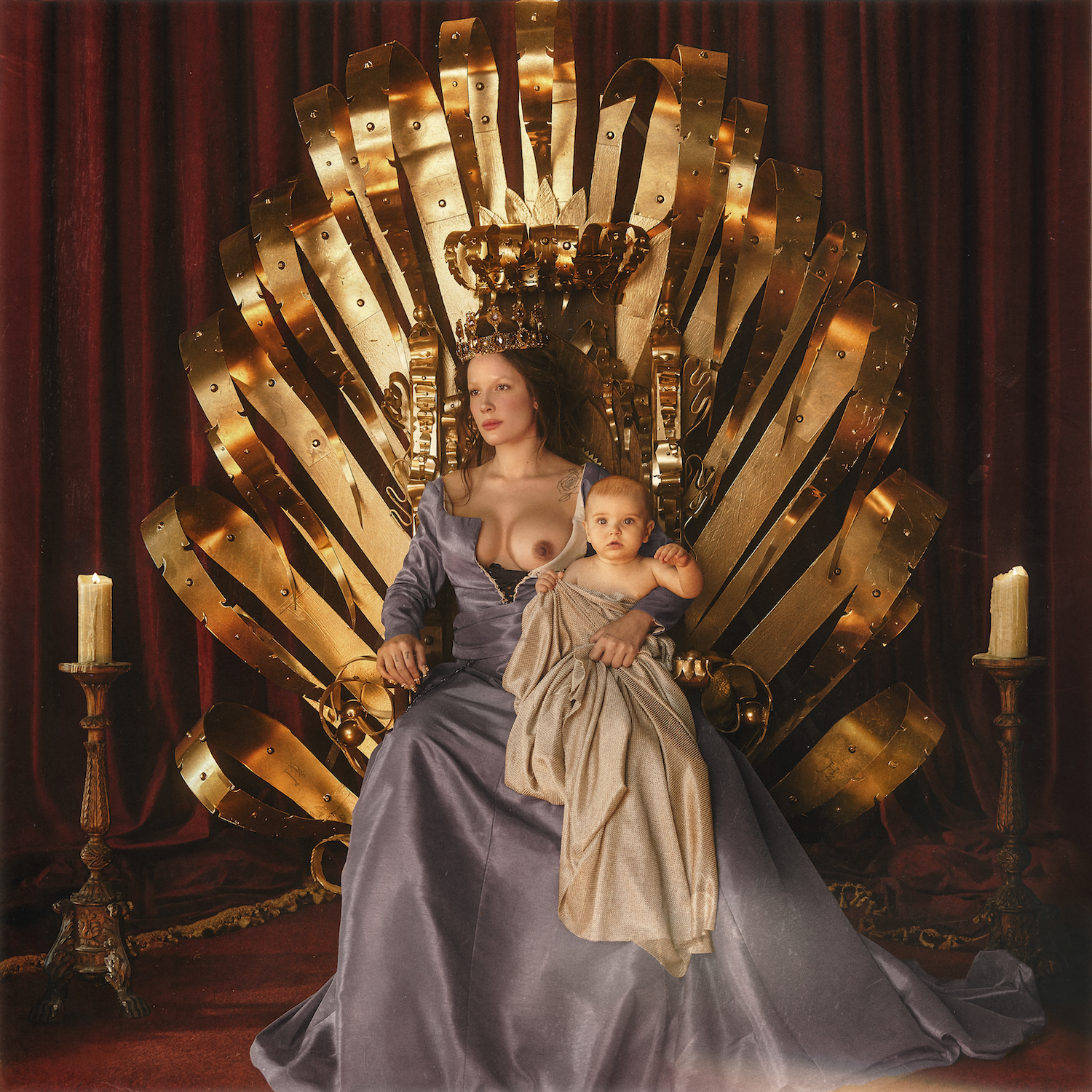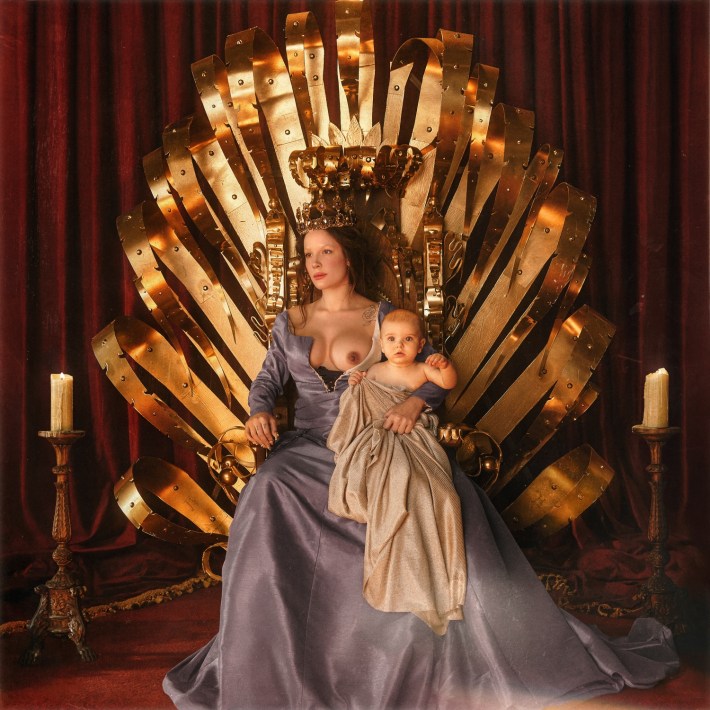- Capitol
- 2021
Halsey has always insisted they are an alternative artist, not a pop star. Maybe those labels are meaningless, but they clearly mean something to Halsey; the singer has argued their case passionately on multiple occasions, sometimes suggesting that gender bias was forcing them into a lane where they did not belong. Still, even as the distinction between "pop" and "alternative" came to feel increasingly moot over the past decade, Halsey kept working with pop professionals, and their music consistently scanned as pop. It was often really good pop music, too. With each successive release, Halsey's creative output got bolder, more inventive, more captivating, to the point that I sometimes forget that a smash Chainsmokers single once threatened to overshadow their career. By the time Manic dropped last January, Halsey had compiled one of the more rewarding discographies in the modern mainstream, one that blew through trends as voraciously as Bowie or Madonna while still feeling of a piece.
Manic was at the forefront of one of those trends: an influx of rock influence within modern pop. Although that album's minimal, deconstructed sound was reminiscent of Frank Ocean and Billie Eilish, it also found Halsey singing over loud distorted guitars on the punchy '90s pop-rock throwback "3am" and featuring Alanis Morissette on another song. In the year and a half since then, quite a few artists have had success incorporating rock sounds into a pop or rap template. Songs like 24kGoldn and Iann Dior's "Mood" and Olivia Rodrigo's "good 4 u" have topped the Hot 100. Many acts have turned to blink-182's Travis Barker for a pop-punk makeover, most famously Machine Gun Kelly, whose #1 album Tickets To My Downfall included a duet with Halsey. For an artist who has navigated cultural currents as well as anyone, this would have been an easy wave to ride. But the album Halsey is about to release makes most of that stuff seem quaint.
If I Can't Have Love, I Want Power is decidedly not a pop album, though it's certainly a catchy one. If you know anything about the project, you know all 13 tracks were produced and co-written by Trent Reznor and Atticus Ross -- two-time Oscar-winning composers and the current core membership of Nine Inch Nails. The duo has turned loose their talents for aggression and foreboding on an exhilarating range of experiments, assisted by an array of noteworthy contributors who tease the sound of the album in wildly disparate directions. Halsey's knack for melody ensures that these tracks are accessible even at their noisiest, and their shared vision with Reznor and Ross keeps the project centered even as it veers from idea to idea. Halsey stepped fully into the "alternative" identity they have always claimed, and the results are spectacular.
I was worried about this album. Between Ross and Reznor's role in shaping Hollywood's sonic sensibility, the existence of a companion film by elite music video director Colin Tilley, and some of the darker material in Halsey's own back catalog, I feared that If I Can't Have Love, I Want Power would be an album's worth of turgid movie-trailer music, "cinematic" rendered as overblown and slow-footed. Instead, it marries its creators' perspectives seamlessly and dynamically. Reznor's presence comes through from the very beginning, when an extremely "Hurt"-esque piano part introduces "The Tradition." Within seconds, Halsey brings their own signature flourishes to the mix -- those sweet but biting, alternately forceful and fluttery vocals that have characterized their work since "Ghost," those lyrics that serve up intense melodrama without flinching. "Oh the loneliest girl in town/ Is bought for pennies a price/ We dress her up in lovely gowns/ She’s easy on the eyes," Halsey sings. "Her soul is black, and it’s a fact/ That her sneer will eat you alive/ The buyer always brings her back/ Because all she does is cry."
Halsey wrote and recorded If I Can't Have Love, I Want Power while pregnant with their first child, a boy named Ender Ridley Aydin born last month. They have called it "a concept album about the joys and horrors of pregnancy and childbirth," a reassertion of their own autonomy exploring "the dichotomy of the Madonna and the Whore. The idea that me as a sexual being and my body as a vessel and gift to my child are two concepts that can co-exist peacefully and powerfully." As such, there are lines that could be directly sung to her baby and lines that could be about the life-altering experience of carrying a child, but also lyrics about romantic discord and sensual pursuits and general emotional tumult. It's a dense text about complicated feelings, littered with hooky phrases to shout along with but leaving lots of room for interpretation. There's room here for doting parental reflections like "Foolish men have tried, but only you have shown me how to love being alive" and for more carnal turns like "This is the glimmer of light that you’re keeping alive when you tell yourself, 'I bet I could fuck him.'"
Appropriately, the range of musical moods, tempos, and textures here is head-spinning. The Bug's Kevin Martin laces "Bells In Santa Fe" with a tensely flickering pulse, like LCD Soundsystem's "All My Friends" turned inside out. The breathlessly intense and cathartically angry "Easier Than Lying" is the kind of scorched-earth assault Reznor has always specialized in. "Lilith" recruits D'Angelo's rhythm section, the veteran drummer Karriem Riggins and bassist Pino Palladino, for a spacious, swinging hip-hop groove shot through with blustery noise. (Bravo to the glitchy distortion applied to Halsey's voice when they say "corrupted.") On the stunning "Girl Is A Gun," hyperactive programming by Meat Beat Manifesto's Jack Dangers becomes a hall of mirrors for Halsey's laser-beam vocals -- think "Blue Monday" gone drum 'n' bass. A tidal wave of guitar distortion from TV On The Radio's Dave Sitek carries the sarcastic lament "You Asked For This," while just about everything but Lindsey Buckingham's acoustic finger-picking disappears from the frame on the tender "My Darling."
These songs all appear in a row in that order, and what a ride they amount to. The second half of the album is not quite so consistently surprising, but Halsey's chemistry with Reznor and Ross continues to be potent. Plaintive piano, ominous synths, and aggro overdriven bass abound, assembled into configurations that keep the songs engaging even after the shock of the Halsey/NIN experiment has worn off. Dave Grohl shows up to drum on "Honey," characteristically fervent but rather inconspicuous compared to, say, his work on Songs For The Deaf; it's the closest thing to a pop-punk song here, but one that replaces the guitars with a wash of ethereal keyboard sounds. The self-consciously anthemic "I'm Not A Woman, I'm A God" comes closest to the sub-Purity Ring pastiche I had feared but ends up closer to "Closer" (the Nine Inch Nails "Closer," I should specify, and not the Chainsmokers "Closer"). As the track rolls on, my wariness gives way to the symphony of flickering synths Reznor and Ross build around Halsey's eminently quotable refrain.
It's emblematic of a collaboration that should please Halsey fans and Nine Inch Nails fans alike, one that has me eager to see the NIN braintrust take on more projects like this. (I say this as someone who likes Jack Antonoff just fine: Imagine if Trent Reznor became the new Jack Antonoff.) When Reznor's voice finally emerges in the distance at the end of "The Lighthouse," it elicits a thrilling jolt of recognition. It might send you flashing back to any number of meditative NIN tracks across the span of decades, and it works as a nice bit of punctuation for this partnership. Yet Halsey so thoroughly commands the album's sonic landscape that Reznor's brief appearance is almost jarring, too, as if he's breaking the fourth wall. Halsey made a point of not having any featured vocalists on this record, and they've made the most of that spotlight. I'd call If I Can't Have Love, I Want Power one of those statement albums that change the course of an artist's career, except according to Halsey, this is where they've always been headed.
https://youtube.com/watch?v=eM7luZ-00RI
https://youtube.com/watch?v=i45PAqrGDLc
If I Can't Have Love, I Want Power is out 8/27 on Capitol. The accompanying film premieres today at IMAX theaters across North America, with international screenings on 8/26.







